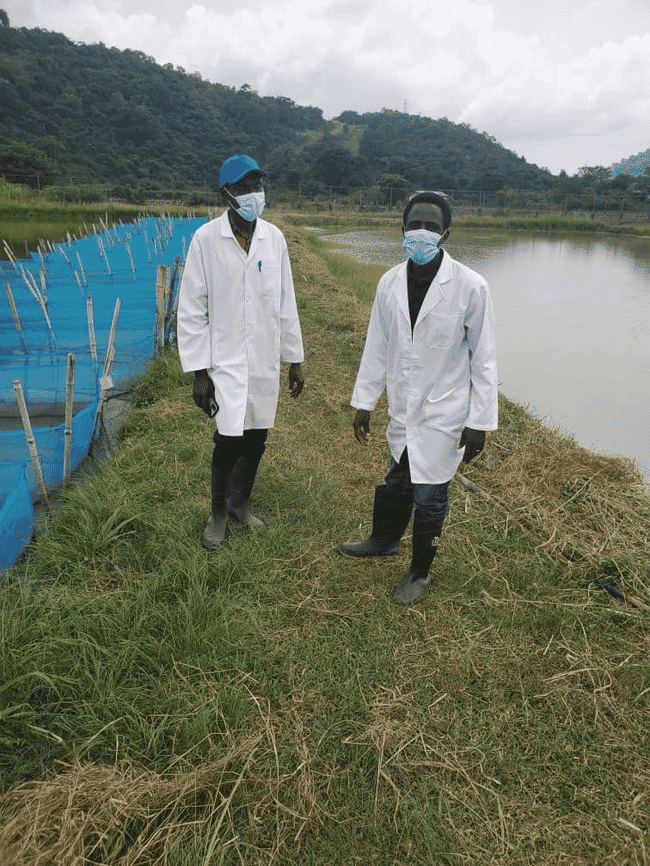
Heterotis niloticus can grow to over 3 kg in less than eight months
The African bony tongue (Heterotis niloticus) is native to most parts of Africa, is hardy and has a high growth rate. Although it is mainly used as a flavouring in soups and stews, it’s very highly regarded by consumers. It is currently grown by a number of commercial fish farmers in Ghana and Nigeria, but nowhere near the scale of tilapia and catfish.
However, following extensive research, Ghana’s Aquaculture Research and Development Centre (ARDEC) is poised for the commercial mass production of Heterotis – a breakthrough which they believe could result in the species catching up with tilapia and catfish – the two most widely consumed fish in the region.
However, this has not been without its difficulties, as Dr Etornyo Agbeko, a research scientist at ARDEC, concedes.
“The natural characteristics of Heterotis have presented challenges in terms of their acceptance of artificial feed, the survival rates of the fry and their reproduction in captivity. However, after studying the behaviour of Heterotis in their natural environment and their nutritional preferences at various stages of its cycle, a research programme aimed at providing all its natural needs in captivity has begun. We have now developed a diet regime that is working. It is our hope to develop feeds for the different stages of their cycle. This will be done in collaboration with our research team and the local feed industry.”
According to Dr Agbeko, the centre is now ready to supply hatcheries and farms with Heterotis broodstock and fingerlings.
“A few farmers have already received stock, and others will be supplied in the coming weeks. We will scale up production in the coming months. At the same time, we are promoting Heterotis among Ghanaians. It is already known to many people as great for ‘momoni’ (salted, fermented fish), which is used in small quantities as a flavouring in stews and soup, mostly in sub-Saharan Africa. We are also discussing it with people in the catering and processing industry to sustain public interest.”
Due to past challenges with growing Heterotis , some farmers are asking what to do differently this time round and Dr Agbeko has some advice.
“Earthen ponds are more productive for Heterotis survival and growth. Stock with post-fingerlings or juveniles of over 30g size. Maintain vegetative growth along the banks of the pond or the riparian area of the water body. Second, maintain good water quality, with dissolved oxygen >3mg/I, pH 6.5-8.00. . And increase and decrease the water levels between 0.3 – 0.5m every three weeks,” he advises.

Dr Emmanuel Mensah, a research scientist at ARDEC, says that Heterotis has several other qualities that make it suitable for commercial production.
“It naturally spawns in earthen ponds with vegetation. It can grow to a length of an average of about 0.5 metres and well over 3 kg in less than 8 months, and has a lot of flesh for either smoking whole or filleting. It is hardy, so can withstand quite a few health challenges. With the challenges that have been experienced recently in the tilapia industry, the entry of Heterotis is certainly an interesting prospect.”
The potential for increased access to the species is seen as a positive by many fish farmers and processors.
As Mabel Quarshie, CEO of Aquatic Foods, reflects: “For a nation that loves fish so much, the entry of another species onto the wider market can only be a good thing. As a farmer and fish processor, I am excited that I can grow a fish species that is naturally tough, tasty and grows to a bigger marketable size. And as a processor, I like the fact that I now have a bigger meat size to work with. I can produce more sausages, fillets, fish fingers and burgers. I am working with ARDEC to study the response of customers to our products. We will vary levels of spices and other ingredients as we go along. Our hope as aquaculture people is that locally farmed fish will become the dominant protein on the market, and make life a little difficult for imported fish!”
Dr Shadrack Amponsah, CEO of Kumasi-based Wontesty Ventures, one of Ghana’s largest fish farmers and processors, says that his company is poised to grow Heterotis on a large scale.
“We have been working with ARDEC, and by the end of this year we would have started a new Heterotis line. Customers will be able to buy fresh fish from the farm gate and our sales points. We will also process it into the usual sausages, fish fingers, grilled fish and other packages. Although it is not as popular as tilapia and catfish, Heterotis has a dedicated following of its own. That is why it is called ‘supa cu’, probably a corruption of ‘super cool’. We are starting on a modest scale, whilst creating awareness among the public. I am confident that now that good quality starting material is going to be available, farmers will enjoy the benefits of growing another healthy, tasty fish, and Ghanaians will enjoy a ‘super cool delight’,” he reflects.




